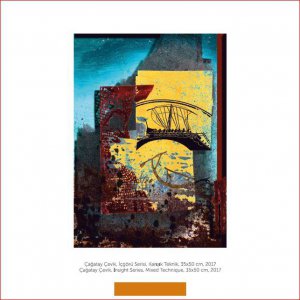Coordinator: Prof. Dr. Alp Yücel KAYA
Doç. Dr. Sevinç Gök İpekçioğlu
Doç. Dr. Elif Koparal
Doç. Dr. Zeynep AKTÜRE
Dr. Öğretim Üyesi Ahmet UHRİ
Araş. Gör. Dr. Fatih Hakan KAYA
Dr. Dilek Akyalçın KAYA
Dr. Öğretim Üyesi Erkan SERÇE
Dr. Öğretim Üyesi İrfan KOKDAŞ
Dr. Öğretim Üyesi Serkan ŞAVK
Doç. Dr. Yahya ARAZ
Doç. Dr. Zehra Akdemir
Dr. Serhan Kemal SAYGI
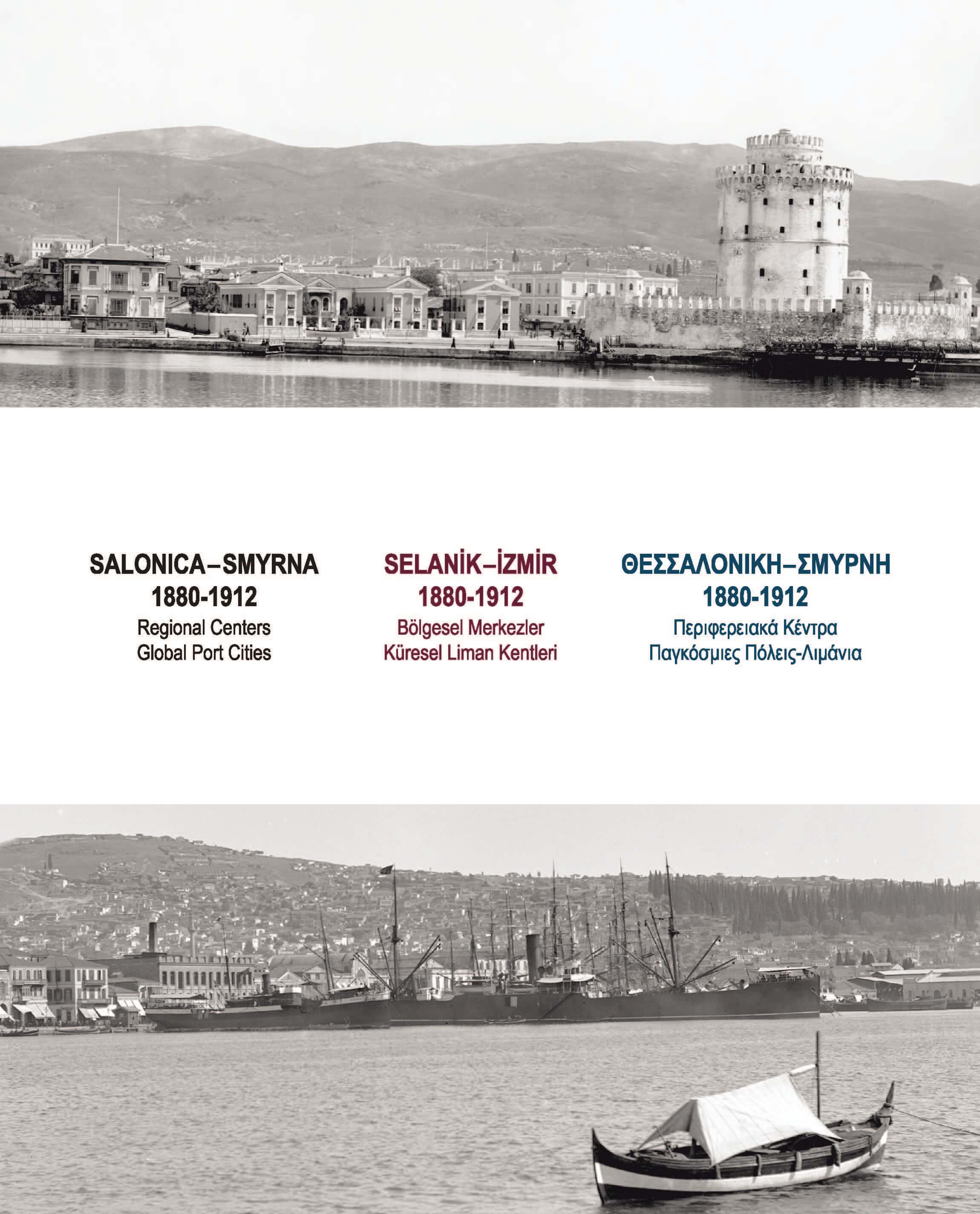
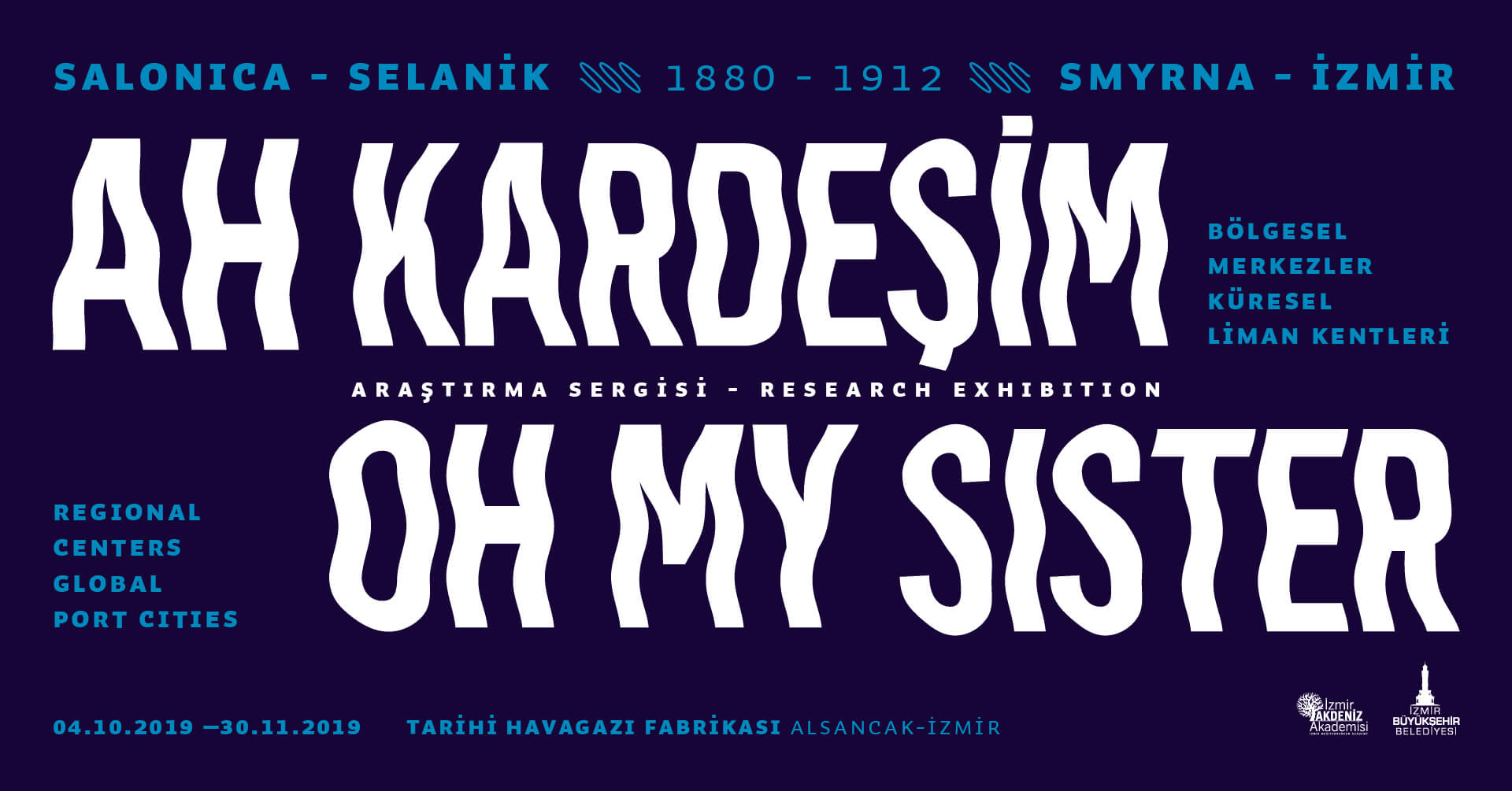
Oh My Sister
Salonica-Smyrna Exhibition and Panel
The “Mediterranean Urban Portraits Project”, initiated by the Izmir Mediterranean Academy with an international workshop on Thessaloniki and Izmir in 2016, continues with a research exhibition and panel on the relations of these two historical port cities.
Ah My Sister 1880-1912 Regional Centers, Global Port Cities exhibition focuses on these two important port cities of the Eastern Mediterranean from a comparative perspective, without neglecting each city’s own peculiarities. Curated by Dr. Dilek Akyalçın Kaya, the exhibition allows us to trace the effects of the post-industrial revolution process on the fabric of these cities and societies. The exhibition, where we will have the opportunity to look at the historical bonds between these two cities, which are seen as ‘siblings’ in our time will be open to public viewing between 4 October and 30 November 2019 at the Historic Gas Factory Exhibition Gallery. The exhibition is scheduled to run in Thessaloniki, too, in 2020.
As part of the exhibition, a panel will be held on November 2, 2019, at 14.00 at the Historical Gas Factory. The panel will be moderated by Dr. Dilek Akyalçın Kaya and the participants will include Professor Vassilis Colonas [University of Thessaly], Dr. Erkan Serçe [Dokuz Eylül University] and Yiannis Epaminondas [Director of Cultural Foundation of the National Bank of Greece, MIET]. We expect to witness through this panel, the turbulent and exciting histories of these two port cities that have experienced the process in connection with each other.

MEDITERRANEAN URBAN PORTRAITS
Oh My Sister
Salonica-Smyrna Exhibition and Panel
The “Mediterranean Urban Portraits Project”, initiated by the Izmir Mediterranean Academy with an international workshop on Thessaloniki and Izmir in 2016, continues with a research exhibition and panel on the relations of these two historical port cities.
Ah My Sister 1880-1912 Regional Centers, Global Port Cities exhibition focuses on these two important port cities of the Eastern Mediterranean from a comparative perspective, without neglecting each city’s own peculiarities. Curated by Dr. Dilek Akyalçın Kaya, the exhibition allows us to trace the effects of the post-industrial revolution process on the fabric of these cities and societies. The exhibition, where we will have the opportunity to look at the historical bonds between these two cities, which are seen as ‘siblings’ in our time will be open to public viewing between 4 October and 30 November 2019 at the Historic Gas Factory Exhibition Gallery. The exhibition is scheduled to run in Thessaloniki, too, in 2020.
As part of the exhibition, a panel will be held on November 2, 2019, at 14.00 at the Historical Gas Factory. The panel will be moderated by Dr. Dilek Akyalçın Kaya and the participants will include Professor Vassilis Colonas [University of Thessaly], Dr. Erkan Serçe [Dokuz Eylül University] and Yiannis Epaminondas [Director of Cultural Foundation of the National Bank of Greece, MIET]. We expect to witness through this panel, the turbulent and exciting histories of these two port cities that have experienced the process in connection with each other.

Conceptual Framework
For a long time, cities of Turkey and around the world have faced challenges from social, economic and ecological bottlenecks. Concerns and discontent about a wide field of issues ranging from working conditions to shaping our environment, from modes of transport to nutrition habits, and from learning environments to the sustainability of our ecological resources, are mounting. In parallel to the ongoing conflicts in various geographies around the world, the difficulties of displaced societies in establishing a new life in different geographies are increasing and force societies to rethink the conditions of coexistence. Existing institutional structures have difficulty in responding to these issues and the solutions that they present fail to respond to the needs and expectations of large segments of society while falling short of producing radical solutions to ever deepening and sophisticated problems.
This situation leads to increasing criticism of the reforms proposed from within the system, while movements that emerge in response to these problems usually wither away with limited effects, due especially to the oppressive and threatening environment. These conditions pressurize societies to seek new solutions. In fact, in recent times, it has been observed that different sectors of society have been organized in different ways (solidarity networks, platforms, communities, etc.) to overcome the existing problems. Concrete practices that claim to present alternatives to the intra-establishment reform proposals have been developed by different segments of society have been developed. Moreover, increasing problems lead to the emergence of municipal governance experiences that develop unique practices eliminating the hierarchical boundaries between civil society and local governments. It is important that these practices, which move beyond a critical discourse to materialize alternatives to the existing order, are discussed with their different aspects, and that through the analysis of the obtained experience, their perspectives and approaches are conceptualized. “Seeking New Solutions to Social Problems Symposium” aims to achieve this and invites non-government entities, local and regional governments, researchers and academicians to seek answers to the following questions:
1. Discussion on the conditions that necessitate the emergence of new practices and the process of their materialization.
2. What are the similarities and differences between experiences that emerge in different political, economic and social contexts?
3. What are the values and concepts that underpin the development of new structures? How do they differ from the values and concepts that conventional practices and institutions are based on?
4. What is their chance of becoming an alternative that differs from the existing order? What are their limitations?
5. What are the conditions of these new formations to survive? What challenges do they face? How can these challenges be overcome?
6. What distinguishes the contemporary conditions and the practices that are being built under these conditions from the conventional experiences? Is it appropriate to consider a continuity? Or, do they present an unprecedented experience?
7. How can the emergent experiences and practices be conceptualized?

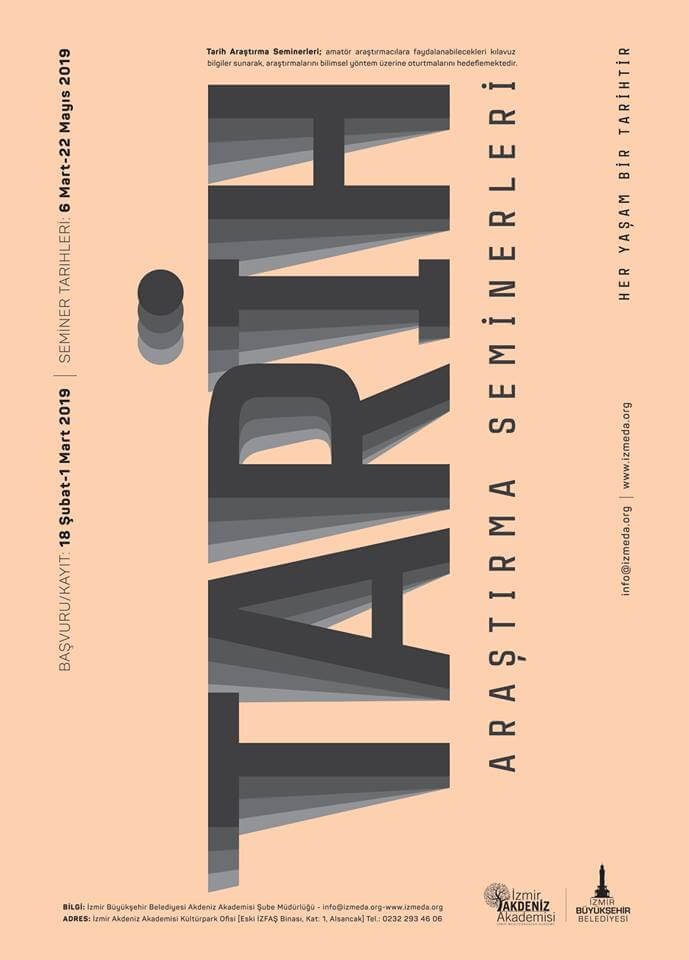
HISTORY RESEARCH SEMINARS -2019
The latest in the series of ‘History Research Seminars’ organized by the Izmir Mediterranean Academy – staged annually since 2017 – were held between 6 March and 22 May 2019. The seminars, entitled ‘Izmir and the Mediterranean’ and that bring together amateur researchers with expert academics, consisted of the following lectures:
Associate Professor Mehmet Kuyurtar, “History, Philosophy of History, Science of History” (6 March 2019)
Professor M. Erdem Özgür, “Economy and History” (13 March 2019)
Dr Irfan Kökdaş, “History of Agriculture and Animal Husbandry in Anatolia” (20 March 2019)
Lecturer M. Ali Demirbaş, “Archive Records of Ottoman/Republican Eras” (27 March 2019)
Dr Nuri Adıyeke, “Izmir and the Mediterranean in History” (3 April 2019)
Dr Serkan Şavk, “Izmir in the Films and the Use of Moving Images as Historical Source” (10 April 2019)
Professor A: Nükhet Adıyeke, “Islands in Izmir-Mediterranean Connection: Resources, Methods” (17 April 2019)
Dr Dilek Akyalçın Kaya, “Eastern Mediterranean Port Cities in the 19th Century” (24 April 2019)
Dr Ahmet Uhri, “Should an Archeologist be Consulted about the Human Mind?” (1 May 2019)
Dr. Kemal Saygı “Conducting Research in the Ahmet Piriştina City Archive and Museum” [8 May 2019]
Dr. Ahmet Mehmetefendioğlu-“The Centenary of 15 May 1919 and Izmir” [15 May 2019],
Dr. F. Hakan Kaya-“Archeology and Collectorship in Turkey [22 May 2019].
In addition to history, during the twelve-week long series of seminars participants attended lectures on fields such as philosophy, archaeology, economy and communications. This way, in addition to introduction to history, they were informed on how to relate the science of history with other disciplines.
The seminars enabled the participants to gain a new perspective in their approach to the city and geography that they live in, with 41 of the participants also being awarded certificates.

Anniversary for the 150 years since the establishment of the Izmir Municipality
International Symposium: Local Government, Democracy and Izmir
15-16-17 November 2018
Ahmed Adnan Saygun Arts Center Izmir
Thursday 15th November 2018
10.30-11.15 Welcoming Speeches
Alp Yücel KAYA[Prof. Dr., Ege University, Member of the Scientific Board of the Izmir Mediterranean Academy, Coordinator of the Department of History]
Aziz KOCAOĞLU [Mayor of the Metropolitan Municipality of Izmir]
11.15- 13.00 Session I.
LOCAL POLITICS, THE MEDITERRANEAN AND DEMOCRACY -1
Chair of the Session: Serkan ŞAVK [Dr., Faculty Member, Izmir University of Economics]
Nora LAFI [Dr., Leibniz-Zentrum Moderner Orient]
Reinterpreting Municipal History: Izmir in Late-Ottoman Times in the Mirror of Recent Interpretive Turns About the Tanzimat
Tülin SELVİ ÜNLÜ [Dr, Mersin University, Mediterranean Urban Research Centre]
Modernization and Planning Practices in Eastern Mediterranean Port Cities
Sotirios DIMITRIADIS [Dr., Aristotle University of Thessaloniki]
Local authority Between Empire and Nation State: The Municipality of Thessaloniki from Ottoman to Greek Rule
Dilek AKYALÇIN KAYA [Dr.]
Becoming Mayor in the Ottoman Empire at the End of the Nineteenth Century: Example of Salonika
14.30-16.10 Session II.
LOCAL POLITICS, HISTORY AND DEMOCRACY-1
Chair of the Session: Ercan UYANIK [Assoc. Prof. Dr., Dokuz Eylül University]
Gülay TULASOĞLU [Dr., Faculty Member, Hacettepe University]
Local Freedoms Central Restrictions: The Case of Izmir as Trade
Feryal TANSUĞ [Dr., Faculty Member, Bahçeşehir University]
Urban Development and Public Services in Izmir on the eve of the Foundation of the Municipality of Izmir
Stefan KNOST [Dr., Martin Luther University Halle]
Urban Development and Local Governance in 19th and 20th Century Aleppo
Friday 16th November 2018
10:00-10:40 Special Session
Chair of the Session: Nora LAFI [Dr., Leibniz-Zentrum Moderner Orient]
İlber Ortaylı [Prof. Dr.]
11:00-13:00 Session III.
LOCAL ADMINISTRATION, HISTORY AND SERVICES
Chair of the Session: İrfan KOKDAS [Dr., Faculty Member, Katip Çelebi University]
Sadık KURT [ Dr., Dokuz Eylül University]
ESHOT From Past to Today, (Electricity, Water, Coal Gas, Bus, Trolleybus)
Akın ERSOY [Dr., Faculty Member, Dokuz Eylül University]- Sarp ALATEPELİ [ Dr., Faculty Member, Katip Çelebi University]
From Past to Present, Izmir’s Municipal Authorities’ Vision about the Archaeology
Adil ÇAMUR [Research Assistant, Dokuz Eylül University]
Local Governments and the Migration
Özkan YILDIZ [Prof. Dr., Dokuz Eylül University]
Syrian Refugees in Izmir: Urban Integration and Political Measures
Ali EKŞİ [ Dr. Ege University]
An Assessment of the Contribution to Local Democracy of Essential Volunteering Applications/Procedures for Disaster Management/Administration
14.00-15.40 Session IV.
CHANGES IN LOCAL GOVERNMENT AND NEW POLICIES
Chair of the Session: Ümit ERDEM [Prof. Dr.]
Gülce OLGUN SUSTA [Research Assistant, Ankara University] – Gülşah EREN [Research Assistant, Ankara University]
The role of Lawcode Number 6360 in Rural Sustainability
Nuray ERTÜRK KESKİN [Assoc. Prof. Dr., Ondokuz Mayıs University] – Cuma YILDIRIM [Research Assistant, Ondokuz Mayıs University]
Agricultural Development in Izmir and the Metropolitan Municipality
Güldem ÖZATAĞAN [ Dr, Independent Researcher]- Emel KARAKAYA [Dr, Faculty Member, Izmir Democracy University]
Towards a Radically New Agro-Food Regime? Exploring Izmir’s Agro-Food Transitions in the Making
Gökhan ORHAN [Prof. Dr., Bandırma Onyedi Eylül University]
Local Solutions to a Universal Problem: Local Authorities in Izmir and Climate Change Policies
15.55-17.15 Session V.
URBAN PLANNING AND TRANSFORMATION-1
Chair of the Session: Mehmet PENBECIOĞLU [Dr., Independent Researcher]
Ali Kemal ÇINAR [Dr., Independent Researcher]
Urban Transformation in Izmir and its Projections upon Local Policies.
Emine YETİŞKUL [Assoc. Prof. Dr., Middle East Technical University]
The Evolution of a Research Project, the example of Izmir: An Interpretation of the Changing Pattern of Settlements in Turkey.
Eti AKYÜZ LEVİ [Prof. Dr. Dokuz Eylül University]
The Effect of Squatter Housing upon the Historical Pattern in Izmir
Saturday the 17th November 2018
10.30-11.50 Session VI.
URBAN PLANNING AND TRANSFORMATION-2
Chair of the Session: Güldem ÖZATAĞAN [ Dr, Independent Researcher]
Raziye OBAN [Prof. Dr., Dokuz Eylül University]-Ercan UYANIK [Assoc. Prof. Dr., Dokuz Eylül University]
The Integration Process of the Rural Settlements to the Urban Centre in Buca: Belenbaşı Case
Metin ŞENBİL [Prof. Dr. Gazi University]
IZBAN Effects on Izmir Urban Region
Murat OKÇU[ Prof. Dr., Süleyman Demirel University]- Pınar SAVAŞ YAVUZÇEHRE
[Assoc. Prof. Dr., Pamukkale University]- Nilüfer NEGIZ [ Assoc. Prof. Dr., Süleyman Demirel University]- Hüseyin ÖZGÜR [ Prof. Dr., Pamukkale University]
Research on the perception of Citizen with Regards to Changes Taking Place in the System of Metropolitan Municipality
13.00-14.40 Session VII.
LOCAL POLITICS, HISTORY AND DEMOCRACY-2
Chair of the Session: Bülent TANIK [Former President of Çankaya Municipality]
Sezgi DURGUN [ Dr., Faculty Member, Marmara University]
International Izmir Fair as a Modernizing Element for ‘Urban Consciousness’
Turgay GÜLPINAR [Research Assistant, Dokuz Eylül University]
From a Criminal District to a Socialist Municipality: Gültepe Case
Ercan UYANIK [Assoc. Prof. Dr., Dokuz Eylül University]
The Coup of the 12 of September 1980 and the Izmir Municipality [12nd September 1980 – 25 March 1984)
Sonay BAYRAMOĞLU ÖZUĞURLU [Assoc. Prof. Dr., Ankara University]
A Contribution To Socialist Municipal Administration Approach: The Case Of Turkey
14.55-16.15 Session VIII.
LOCAL POLITICS, HISTORY AND DEMOCRACY-3
Chair of the Session: İbrahim ARAP [Assoc. Prof. Dr. Dokuz Eylül University]
Yeliz ŞANLI ATAY [Dr., Faculty Member, Ankara Yıldırım Beyazıt University]
Recent Developments In The Central Administration -Local Administrations: The Power Of Administrative Tutelage Exercised Over Local Administration Bodies
Ulaş BAYRAKTAR [Dr., Independent Researcher]- Mehmet PENBECIOĞLU [Dr., Independent Researcher]
Germinating Local Democracy in Izmir: An Invitation to a Participatory Discussion about the Commons
Lucie DRECHSELOVA [Dr., Charles University]
Women in Contemporary Izmir Politics
Evin DENİZ [Post-doc. Researcher, Hong Kong University]
From Social Movements Extending to the Municipality of Barcelona, the Search for Democracy
16.30-17.00 Assessment Session
Chair of the Session: Alp Yücel KAYA[Prof. Dr., Ege University, Member of the Scientific Board of the Izmir Mediterranean Academy, Coordinator of the Department of History]
İlhan TEKELİ [Prof. Dr., Middle East Technical University, Honorary Founding President of the Izmir Mediterranean Academy]
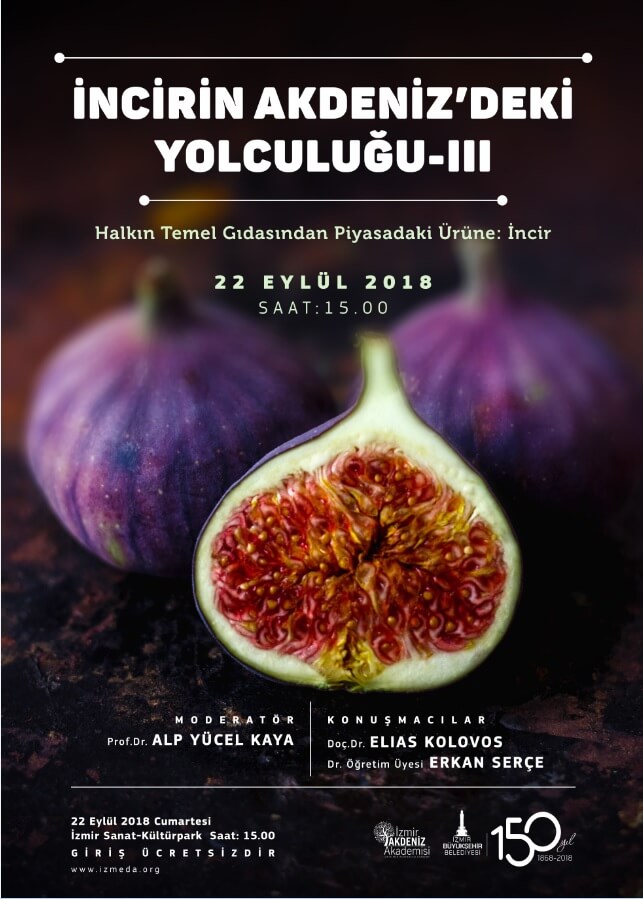
THE JOURNEY OF The FIG IN THE MEDITERRANEAN -III
The third conference of the conference series entitled Journey of the Fig in the Mediterranean was held on 22 September 2018 at the Izmir Sanat Hall.
The conference, entitled “The Fig: From Basic Food of People to Commodity in the Market”, was moderated by Professor Alp Yücel Kaya and with participation by Associate Professor Elias Kolovos and Dr. Erkan Serçe. Kolovos’ paper focused on the Ottoman era nutritional practices along with fig and fig stories in Ottoman records about Aegean coasts and islands. Serçe discussed the meaning of figs for producers, commercial bourgeoisie and laborers during the period between 1850 and 1925, and questioned the ways in which the city of Izmir was affected by this network of relations.
The conference series of “The Journey of the Fig in the Mediterranean” was completed with three conferences that we organized.
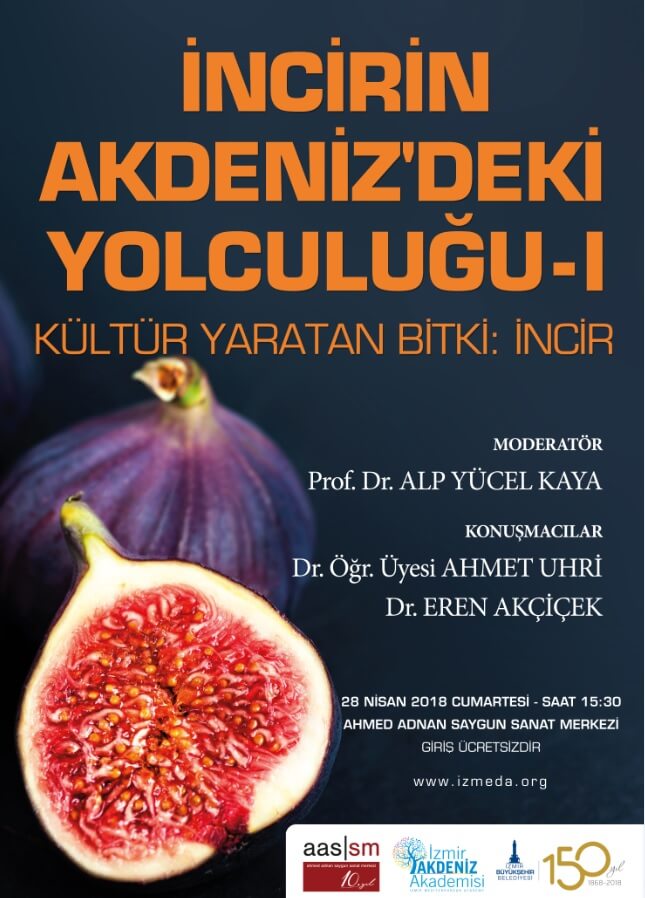
THE JOURNEY OF THE FIG IN THE MEDITERRANEAN -I
The Journey of the Fig in the Mediterranean-I “Fig: A Tree that Generate Culture” was held on 28 May 2018 at the Ahmed Adnan Saygun Art Center.
The conference was moderated by Professor Alp Yücel Kaya with the participation of Dr. Ahmet Uhri and Dr. Eren Akçiçek.
In his presentation, Dr. Ahmet Uhri said that in the emergence of Near Eastern civilizations, in addition to climate and geography plants also had an important place. Uhri pointed out that although wheat and barley were the first plants to be cultivated or domesticated, olives, grapes and figs were the ones that created civilization.
Dr. Eren Akçiçek said the following in his presentation: “Figs are a very important fruit for human nutrition and health. It is a medical diet for it has positive effects on human health because of vitamins, minerals, pulp and various chemicals that it contains”.

The second conference of the Journey of the Fig in the Mediterranean series entitled “The Market and Ecology of Figs” was held on 26 May 2018 at the Ahmed Adnan Saygun Art Center.
The conference was moderated by Professor Alp Yücel Kaya with participation by Dr. Derya Nizam, Bilge Keykubat and Dr. Sunay Dağ.
In her presentation, Derya Nizam explained the characteristics distinguishing between the Aegean fig and the Aydın fig, which are two geographical marks, and discussed the ways of the reproduction of both ecological and cultural borders. Nizam emphasized that geographical mark registrations need to form solidarity networks instead of generating inter-regional competition.
Bilge Keykubat [of the Izmir Stock Exchange] pointed out that dried figs had been an object of attraction in every age and an important commodity for the country: “Figs fill our sight with their appearance, our spirits with its philosophy, our pockets with its income. Its quality concerns all sectors in domestic and international markets.”
Dr. Sunay Dağ shared the conclusions of her doctoral research about the impact of geothermal power plants that proliferate in the Aydın Germencik region, where the highest quality dried fig farming is practiced, on the productivity and quality of fig farming.

HISTORY RESEARCH SEMINARS -2018
In the History Research Seminars, which were held between 7 March and 23 May 2018, the relationship of history with philosophy, archaeology and economy were discussed along with archive usage, oral history study, collectorship and cultural heritage. The seminars that brought together researchers with academic experts consisted of the following topics:
Professor A. Nükhet Adıyeke-“Introduction to History” [7 March 2018]; Associate Professor Mehmet Kuyurtar-“History-Science-Philosophy Relations” [14 March 2018]; Dr. Ahmet Uhri-“Prehistoric Burial Traditions and Prehistoric Human Achievements Before Death” 21 March 2018’ Lecturer M. Ali Demirbaş-“Archive Usage, Document Reading” [28 March 2018]; Dr. Akın Ersoy-“History and Archaeology” [4 April 2018]; Dr. Serkan Şavk-“Online Historiography: Sharing Small Scale Collections and Research over the Internet” [11 April 2018]; Associate Professor M. Erdem Özgür-“Economy and History” [18 April 2018]; Dr. F. Hakan Kaya-“Collecting in Turkey” [25 April 2018]; Dr. Barış Gür-“The Importance and Conservation of Cultural Heritage [2 May 2018]; Dr. Dilek Akyalçın Kaya-“Micro History Applications” [9 May 2018]; Dr. Ahmet Mehmetefendioğlu-“Family History Research and Historiography” [16 May 2018]; and Dr. Nuri Adıyeke-“Dominant Paradigms in Ottoman Historiography” [23 May 2018].
The seminars followed a program that aimed to place historical research over the foundations of scientific method. Thirty-six participants who attended the seminars were awarded certificates. In addition to the lectures delivered by academic experts, the seminars were based on active participation through presentations and questions. By the end of the program, the 36 participants who took part gained a new perspective in their approach to the city and geography that they live in.

THE JOURNEY OF WHEAT IN THE MEDITERRANEAN -V
The final conference of this journey organized by the Izmir Mediterranean Academy through which we witnessed the adventure of wheat was entitled “Things that Happened to Wheat” and was held at the Ahmed Adnan Saygun Art Center on 9 December 2017.
The conference entitled “Things That Happened to Wheat” was moderated by Professor Alp Yücel Kaya with Abdullah Aysu (President of Hububat-Sen), Mustafa Alper Ülgen (Ida Mountain Life and Seed Association) and lawyer Necdet Bayhan giving presentations.
Abdullah Aysu discussed the global and regional importance of wheat in history with reference to the distance that wheat took from the Ottoman era to the present and the impact of wheat on producers and consumers.
Mustafa Alper Ülgen emphasized the importance of local wheat varieties and that food products obtained from wheat are healthier.
Necdet Bayhan said that local wheat from seed to the table is under economic and political pressures of industrial agriculture and nutrition systems. Describing the collapse of social structures as local seed and food processing methods wither away, Bayhan presented the local food groups, problems and solutions through his own experience.
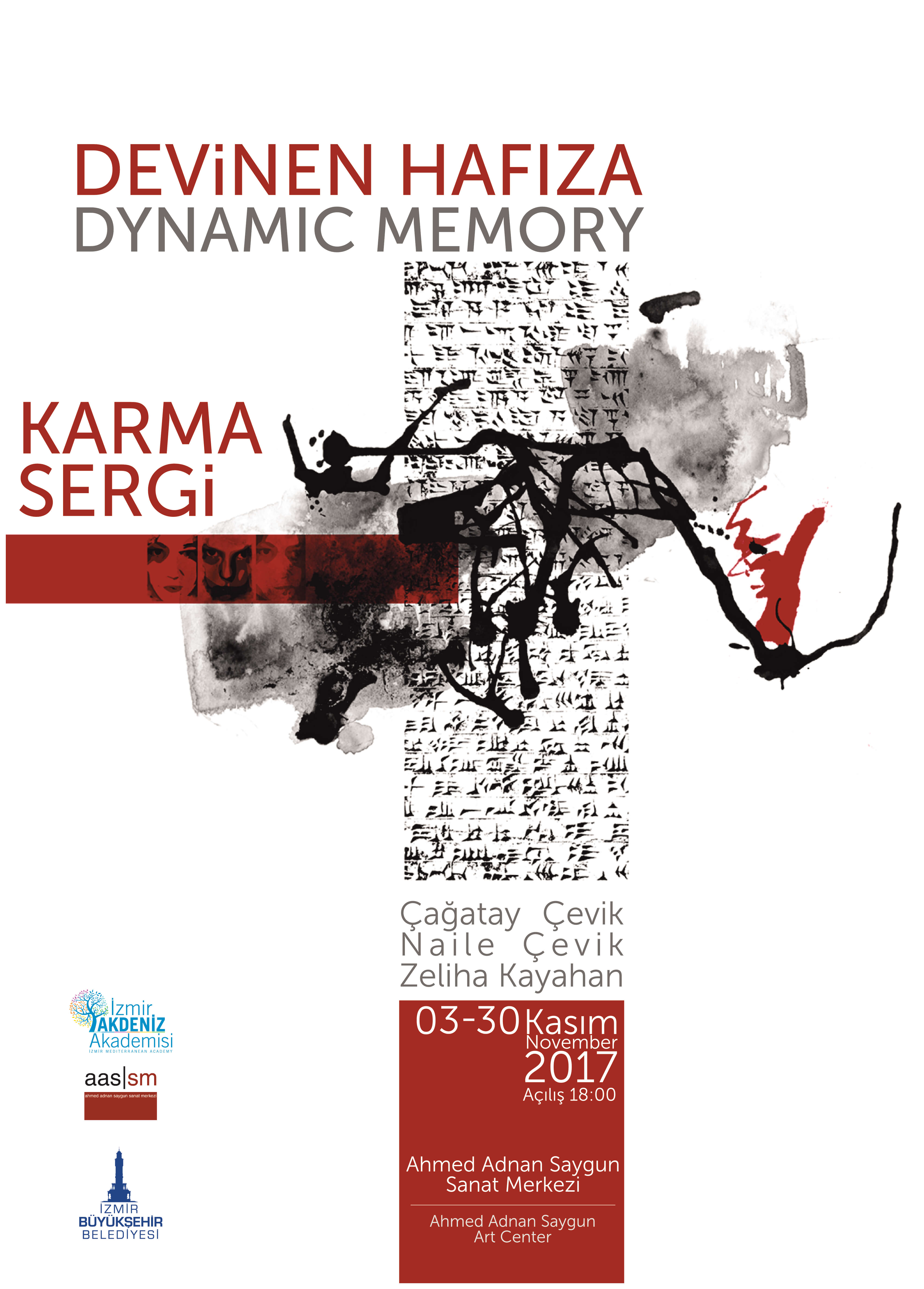
MEMORY IN MOTION COMPOSITE EXHIBITION
The Memory in Motion Composite Exhibition was held between 3 November and 30 November 2017 at the Adnan Saygun Art Center, within the scope of the International Symposium on Mediterranean in Motion organized by the Izmir Mediterranean Academy. The exhibition included works by the artists Çağatay Çevik, Naile Çevik and Zeliha Kayahan.
Graphic designs of Çağatay Çevik elaborated in a minimalist approach, Naile Çevik’s ceramic works of an eclectic structure and Zeliha Kayahan’s painting and print works were exhibited. Çağatay Çevik presented the motion process of his personal memory layer by layer. Naile Çevik presented through hybrid productions the applicability of different disciplines on the same terrain to obtain original productions. Zeliha Kayahan’s works referred to a production spiral that is constant change and transformation, the institutional layers of which lay in abstractions beyond time and space.
Cultural memory forms the layers of social memory through the formation of a collective language of personal memories through time. In a sense, this constitutes a spiral of melting and vanishing within each other. Çağatay Çevik, Naile Çevik and Zeliha Kayahan produced original works that take off from their fictional memories and met under the theme of ‘Mediterranean in Motion’. In this sense, their look at Mediterranean in Motion was a multilayered and dynamic reflection of their looks at their own inner worlds in particular, and to the world and even to universe in general.
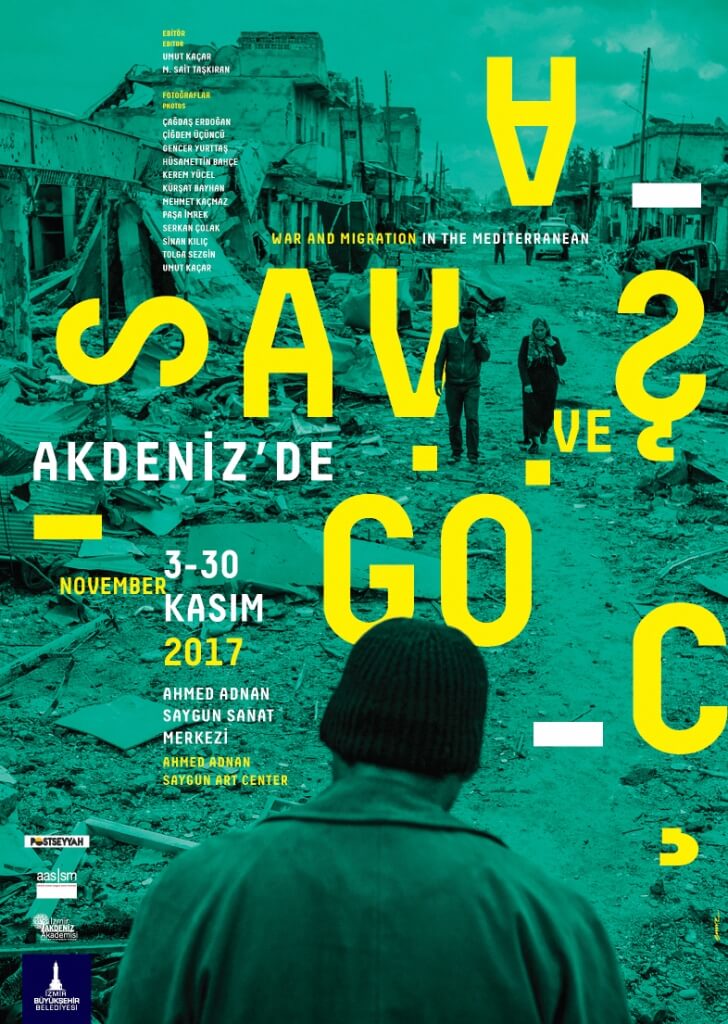
PHOTOGRAPHS OF WAR AND MIGRATION IN THE MEDITERRANEAN EXHIBITION
‘WAR INSTANTLY ENCOMPASSES PEOPLE LIVING BY THEMSELVES’
Photographs of War and Migration in the Mediterranean Exhibition was held between 3 November and 30 November at the Ahmed Adnan Saygun Art Center, within the scope of the International Symposium on Mediterranean in Motion organized by the Izmir Mediterranean Academy. The exhibition was curated by the PostSeyyah photography collective.
The documentary photography works focusing on human movements, the primary agenda of the 21st Century, compiled the photographs of the photography artists Çağdaş Erdoğan, Çiğdem Üçüncü, Gencer Yurttaş, Hüsamettin Bahçe, Kerem Yücel, Kürşat Bayhan, Mehmet Kaçmaz, Paşa İmrek, Serkan Çolak, Sinan Kılıç, Tolga Sezgin and Umut Kaçar, under the editorship of Umut Kaçar.
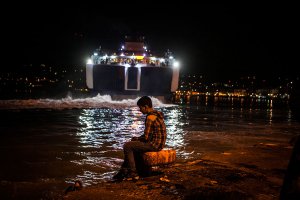

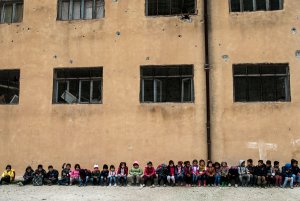

THE JOURNEY OF WHEAT IN THE MEDITERRANEAN -IV
The Journey of Wheat in the Mediterranean-IV “Ecology of Wheat: Local Seeds, Sourdough Bread Loaves” organized by the Izmir Mediterranean Academy was held at the Izmir Sanat-Kültürpark on 14 October 2017. The conference was moderated by Professor Alp Yücel Kaya with presentations by Professor Tayfun Özkaya, Ersin Aylin Bostan (Can Yücel Seed Center) and Mesut Yüce Yıldız.
Professor Özkaya’s presentation was entitled “The Future of Local Wheat and Sourdough Bread” by which he emphasized the need to encourage more research on local wheat and sourdough bread and their effect on health. Özkaya said that the government and municipalities should promote the ventures to this end.
Ersin Aylin Bostan spoke on two topics: the presentation of the Can Yücel Seed Center and its aims, and the production of Karakılçık wheat. Bostan pointed out that the experience of rearing Karakılçık wheat from a handful of seeds contributed to the economic independence of women.
In his presentation entitled “Return to Ancestral Wheats” Mesut Yüce Yıldız said that communities and associations have emerged to enable the production and consumption of healthy wheat, which focus on the rehabilitation of ancestral wheats.

THE JOURNEY OF WHEAT IN THE MEDITERRANEAN -III
The third conference of the conference series “The Journey of Wheat in the Mediterranean” was held at the Ahmed Adnan Saygun Art Center on 23 September 2017.
The conference entitled “Wheat Production and Consumption in Izmir and its Periphery between the 16th and 18th Centuries” was moderated by Professor Alp Yücel Kaya with the participation of Suraiya Faroqhi. Faroqhi’s presentation focused on the wheat that Izmirians purchased from the city markets, and how grains and cereal crops reached to the tables of Izmir inhabitants.

History and Culture Talks-II “Experimental Projects on Marine Archaeology” organized by the Izmir Mediterranean Academy was held on 10 May 2014 at the Ismet Inönü Art Center.
Archeologist Osman Erkurt of the 360 Degree History Research Association, an Izmir-Urla based organization consisting of marine volunteers, presented their experimental projects on “Marine History” and “Marine Archaeology”. Before the talk, Izmir Metropolitan Municipality Youth and Sports Club Underwater Branch conducted a seminar on free diving and spear fishing.

ARCHAEOLOGY TALKS-II
The series of archaeology talks entitled “Stones are Fitting in Place” continued with a talk entitled “Smyrna: the Pioneer of City Planning in the West”. The talk was held at the Izmir Sanat-Kültürpark on 16 October 2013 and chaired by the History Coordinator of the Izmir Mediterranean academy Professor Uygur Kocabaşoğlu. Professor Meral Akurgal outlined the scientific findings of the Smyrna ancient city excavations, which she was conducting. Akurgal pointed out that the first digs of the ancient city were carried out under the conduct of Professor Ekrem Akurgal between 1948 and 1951 – a total of four seasons – by a committee consisting of British and Turkish archaeologists.

The first Izmirians established one of the oldest settlements of Anatolia in the midst of the Bornova Plain. The excavations that commenced in 2005 has been re-writing Izmir’s history.
“Stones are Fitting in Place” is the title of the Archaeology Talks organized by the Izmir Mediterranean Academy. The series commenced on 23 October 2013 with a talk by the head of Yeşilova Tumulus Excavations, Dr. Zafer Derin, entitled “The First Izmir: Yeşilova”. Yeşilova Tumulus, which is the oldest settlement of Izmir was the subject of the talk held at the Izmir Sanat-Kültürpark.
Archaeology Talks facilitated the meeting of Izmirians with the heads of excavation teams in their journeys to the city’s past. Those who were interested in the last minute news from Izmir’s past heard them from the heads of excavation teams that carry on these digs.
- Him Phone : 153
- Fax : 0232 293 39 95
- Central : 0232 293 12 00
- Mimar Sinan Neighborhood, 9 Eylül Square No: 9/1, Culture Park, 1st Hol Mansion, Izmir
- E-Mail : him@izmir.bel.tr




